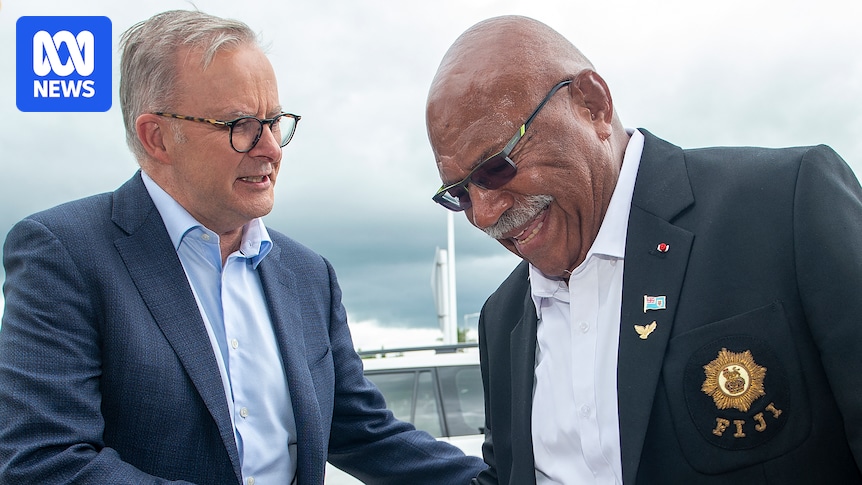
Prime Minister Anthony Albanese has instructed Australian officials to advance negotiations on a new bilateral security treaty with Fiji. This directive came after a meeting with Fiji’s Prime Minister, Sitiveni Rabuka, held on the sidelines of the Pacific Islands Forum (PIF) leaders meeting. The move underscores Australia’s commitment to strengthening ties with key Pacific nations amidst evolving regional dynamics.
The federal government expressed frustration over its inability to finalize a $500 million agreement with Vanuatu during Mr. Albanese’s recent visit to the Pacific nation. Despite this setback, officials remain optimistic about securing the pact in the near future. The push for deeper engagement with larger Pacific nations, particularly Papua New Guinea and Fiji, remains a priority for Australia as these countries appear more amenable to closer ties.
Fiji’s Initiative for Closer Ties
Prime Minister Rabuka initially proposed the idea of a security treaty with Australia during a visit to Canberra earlier this year. At the outset of their recent meeting, Mr. Albanese acknowledged receiving a letter from the Fijian prime minister to initiate negotiations. “We are certainly up for it, and I think we should get our officials working together to make sure we take this important relationship to the next level,” Mr. Albanese stated.
During a subsequent press conference, Mr. Albanese refrained from committing to specific security guarantees for Fiji, akin to those offered to Tuvalu under the Falepili Union. However, he expressed openness to expanding defense ties, which could include increased interoperability and enhanced training initiatives such as the Pacific Policing Initiative.
Australia’s Role in Pacific Climate Resilience
In another development, Mr. Albanese addressed questions regarding Australia’s contribution of $100 million to the Pacific Resilience Facility, a decision he reaffirmed during the PIF meeting. This facility, officially ratified by Pacific leaders, aims to bolster the region’s capacity to tackle the impacts of climate change.
Mr. Albanese emphasized Australia’s responsibility to support its Pacific neighbors in addressing climate challenges. “Some people … argue we shouldn’t do anything on climate change because Australia doesn’t represent 100 percent of global emissions,” he remarked. “There’s a contradiction there. We need to be not just [taking] action ourselves, we need to encourage positive actions for others as well. And in the Pacific, we need to provide support for our Pacific family members.”
Regional Dynamics and Strategic Partnerships
The announcement of the treaty talks coincides with broader geopolitical shifts in the Pacific. Australia’s strategic interests in the region are increasingly influenced by the growing presence of China, which has also been active in providing logistical support for regional events, such as the PIF meeting in the Solomon Islands.
During the forum, Mr. Albanese downplayed concerns about using vehicles provided by the Chinese embassy, stating, “Seriously? It’s a car. Cars get you from A to B.” This pragmatic approach reflects Australia’s focus on practical cooperation and maintaining strong relationships with Pacific nations amid external influences.
The drive to solidify security and economic partnerships in the Pacific aligns with Australia’s broader foreign policy objectives. By engaging with nations like Fiji and Papua New Guinea, Australia seeks to reinforce its role as a key partner in the region, fostering stability and mutual development.
Looking Ahead: Implications and Future Steps
The ongoing negotiations with Fiji represent a significant step in Australia’s efforts to enhance regional security cooperation. As discussions progress, the potential treaty could serve as a model for similar agreements with other Pacific nations, reinforcing Australia’s strategic presence in the region.
Experts suggest that successful treaty negotiations could pave the way for deeper collaboration on issues such as climate resilience, economic development, and disaster response. The outcome of these talks will likely influence Australia’s diplomatic and strategic posture in the Pacific for years to come.
As Australia and Fiji continue to engage in dialogue, the focus remains on building a partnership that addresses mutual interests and strengthens regional stability. The evolving dynamics in the Pacific underscore the importance of proactive diplomacy and strategic alliances in navigating the challenges and opportunities of the 21st century.







